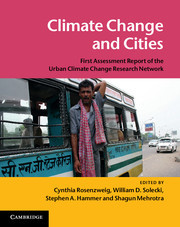Description
Climate Change and Cities
First Assessment Report of the Urban Climate Change Research Network
Coordinators: Rosenzweig Cynthia, Solecki William D., Hammer Stephen A., Mehrotra Shagun
Volume on climate change adaptation and mitigation efforts in cities around the world for policymakers, urban planners, researchers and advanced students.
Language: English
Publication date: 04-2011
312 p. · 22x27.6 cm · Paperback
312 p. · 22x27.6 cm · Paperback
Description
/li>Contents
/li>Biography
/li>
Urban areas are home to over half the world's people and are at the forefront of the climate change issue. The need for a global research effort to establish the current understanding of climate change adaptation and mitigation at the city level is urgent. To meet this goal a coalition of international researchers - the Urban Climate Change Research Network (UCCRN) - was formed at the time of the C40 Large Cities Climate Summit in New York in 2007. This book is the First UCCRN Assessment Report on Climate Change and Cities. The authors are all international experts from a diverse range of cities with varying socio-economic conditions, from both the developing and developed world. It is invaluable for mayors, city officials and policymakers; urban sustainability officers and urban planners; and researchers, professors and advanced students.
Forewords; Acknowledgements; Executive summary; 1. Introduction; Part I. Defining the Risk Framework: 2. Cities, disasters and climate risk; 3. Urban climate: processes, trends and projections; Part II. Urban Sectors: 4. Climate change and urban energy systems; 5. Climate change, water and wastewater; 6. Climate change and urban transportation systems; 7. Climate change and human health in cities; Part III. Cross-Cutting Issues: 8. The role of urban land in climate change; 9. Cities and climate change: the challenges for governance; Annex: list of contributors; Index.
Cynthia Rosenzweig is a Senior Research Scientist at the NASA Goddard Institute for Space Studies where she heads the Climate Impacts Group. She recently co-chaired the New York City Panel on Climate Change, a body of experts convened by the Mayor to advise the city on adaptation for its critical infrastructure. She co-led the Metropolitan East Coast Regional Assessment of the U.S. National Assessment of the Potential Consequences of Climate Variability and Change, sponsored by the U.S. Global Change Research Program. She was a Coordinating Lead Author of the IPCC Working Group II Fourth Assessment Report, and served on the IPCC Task Group on Data and Scenario Support for Impact and Climate Analysis. A recipient of a Guggenheim Fellowship, she joins impact models with climate models to predict future outcomes of both land-based and urban systems under altered climate conditions. She is a Professor at Barnard College and a Senior Research Scientist at the Earth Institute at Columbia University.
William Solecki is a Professor in the Department of Geography, Hunter College, City University of New York. He has led or co-led numerous projects on the process of urban environmental change and transformation. As Director of the CUNY Institute for Sustainable Cities, he has worked extensively on connecting cutting-edge urban environmental science to everyday practice and action in cities. He most recently served as Co-Chair of the New York Panel on Climate Change. He is also a member of the Scientific Steering Committee of the Urban and Global Environmental Change core project of the International Human Dimensions Programme.
Stephen Hammer is the Executive Director of the Energy Smart Cities Initiative, a project of the Joint U.S.-China Collaboration on Clean Energy (JUCCCE), which runs energy and climate policy training and technical assistance programs for local governments around China. Stephen joined JUCCCE in January 2010 after serving as director of the Urban En
William Solecki is a Professor in the Department of Geography, Hunter College, City University of New York. He has led or co-led numerous projects on the process of urban environmental change and transformation. As Director of the CUNY Institute for Sustainable Cities, he has worked extensively on connecting cutting-edge urban environmental science to everyday practice and action in cities. He most recently served as Co-Chair of the New York Panel on Climate Change. He is also a member of the Scientific Steering Committee of the Urban and Global Environmental Change core project of the International Human Dimensions Programme.
Stephen Hammer is the Executive Director of the Energy Smart Cities Initiative, a project of the Joint U.S.-China Collaboration on Clean Energy (JUCCCE), which runs energy and climate policy training and technical assistance programs for local governments around China. Stephen joined JUCCCE in January 2010 after serving as director of the Urban En
© 2024 LAVOISIER S.A.S.
These books may interest you

Climate Change and CitiesSecond Assessment Report of the Urban Climate Change Research Network 71.34 €

Cities and Climate Change 78.36 €


